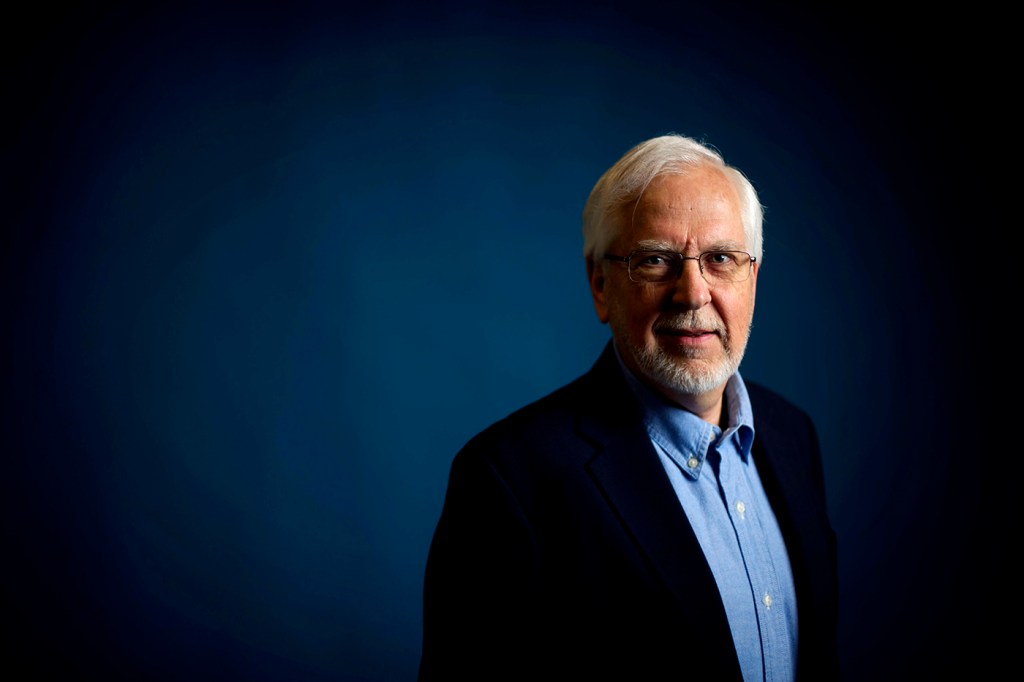Monopolies are shrinking the competition in the American economy, Northeastern professor tells U.S. senators

John Kwoka understood what was wrong with the American economy, and he was prepared to offer solutions. But knowing and persuading are two different things, especially when you are being called to testify before the U.S. Senate.
Could he tell his story in a way that might break through the partisanship and polarization of Washington?
Kwoka, the Neal F. Finnegan Distinguished Professor of Economics at Northeastern, has pieced together a powerful story of a depressing trend. Over the last two decades, the number of major airlines has shrunk from seven to four. In that same time, the eight big accounting firms have been consolidated down to four. Where there used to be eight or nine rivals in the car-rental business, there are now only three. There are two surviving pharmacy chains, two dominant mattress manufacturers, two colossal brewers.
Competition has been declining throughout the country as conglomerates have grown more powerful. The snowballing trend of higher prices for lesser goods and services has been fed by administrations from both parties. Kwoka testified that a variety of studies affirm what Americans already know: They have fewer airlines, fewer producers of pet food, and a smaller variety of other products and services from which to choose.
“Competition policy has been too permissive, which has allowed a lot of mergers that have been anti-competitive,” Kwoka says. “We’ve also not addressed the major tech companies adequately.”
In 1998, aggressive antitrust enforcement by the Justice Department and Federal Trade Commission were celebrated for generating competition in the American economy. But now, as Kwoka explained to the judiciary subcommittee on antitrust, competition policy, and consumer rights on March 5, that oversight strength has been transformed into a weakness.
“I began by quoting the assistant attorney general for antitrust in 1998,” says Kwoka. “He said that the American economy was probably more competitive in 1998 than it had been for a very long time.”
Kwoka, soft-spoken and respectful of contrary opinions, has been developing his message on a variety of fronts. His 2015 book, Mergers, Merger Control, and Remedies in the United States: A Retrospective Analysis of U.S. Policy, strengthened his public persona.
“From the panels that I’ve been on, people have said that it triggered a great deal of debate about competition policy,” Kwoka says of his book. “So, whether it’s true or false, I know it has some impact.”
The tech giants—Microsoft, Amazon, Google, Facebook, and Apple—have acquired more than 600 companies over the last 20 years, Kwoka testified. Like other monopolies, they’ve eliminated current competitors and snuffed out future rivals who might have mounted a challenge to their empires. (On Friday, one Democratic presidential candidate, U.S. Senator Elizabeth Warren proposed breaking up the biggest tech firms.)
The main solution, as offered by Kwoka, is to return to the oversight of the previous millennium, when the burden of proof was on companies to show that their proposed mergers would not hurt competition. Senator Amy Klobuchar, Democrat from Minnesota, has submitted a bill that would renew that traditional standard—thereby undoing the recent trend that has shifted the burden of proof onto the oversight agencies.
“This would simultaneously make merger control both more effective and more efficient—a hard combination to beat,” Kwoka said.
Kwoka said he was gratified to hear Republican senators Mike Lee (the subcommittee chairman from Utah) and Josh Hawley (of Missouri) express their desire during the hearing for increased competition.
“This may seem naive, but my hope is with better information, and recommendations that seem realistic and likely effective to them, that there will be movement on some of these recommendations that I and others have, so that we don’t see a continuation of this trend,” Kwoka says. “Eight years ago, these antitrust issues were not on anybody’s radar screen. There was little or no discussion outside of a small community. But now there is, and with good reason.”
Kwoka was reminded that his work has real-life implications as he struggled to complete his day trip to the Senate. His morning flight to Washington was 90 minutes late, and the return flight to Boston that evening was canceled.
“I had to scramble just to get back home,” he said. “It’s absolutely true that price and capacity are huge issues in airlines right now.”
For media inquiries, please contact media@northeastern.edu.






